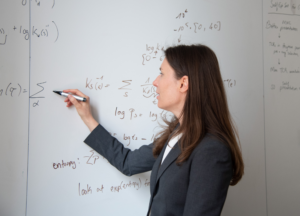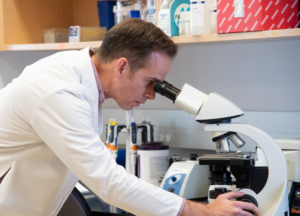PRESS RELEASE: The Pershing Square Sohn Cancer Research Alliance Celebrates Its 10th Anniversary; Annual $5.25M Pershing Square Sohn Prize Awarded to Seven Innovators
THE PERSHING SQUARE SOHN CANCER RESEARCH ALLIANCE CELEBRATES ITS 10TH ANNIVERSARY
PSSCRA HAS COMMITTED OVER $40 MILLION IN SUPPORT OF 66 INNOVATORS IN CANCER RESEARCH IN THE PAST DECADE
Annual $5.25M Pershing Square Sohn Prize Awarded to Seven Innovators in the Greater New York Area to Empower High-Risk, High-Reward Cancer Research
NEW YORK, MAY 16, 2023 (Business Wire) — The Pershing Square Sohn Cancer Research Alliance today announced the seven winners of the 2023 Pershing Square Sohn Prize for Young Investigators in Cancer Research, awarded annually to cancer research scientists and physician-scientists based in the greater New York City area. The Prize empowers investigators early in their independent careers to pursue their most exciting research projects at a critical stage when traditional funding is lacking. Recipients receive $250,000 per year for three years, totaling $750,000 per awardee.
Over the past decade, the Alliance has awarded over $40 million to 66 scientists at 13 institutions in the greater New York City area to advance their research. With this funding, investigators have been able to launch their careers, do some of their boldest and most exciting work, and uncover novel biological pathways, tools, models, and potential therapeutic approaches. In addition to funding, the Alliance provides Prize winners with opportunities to present their work to scientific and business audiences to encourage collaboration and help bridge the gap between academia and industry.

“What the Pershing Square Sohn Prize gave me was scientific freedom, which is perhaps the most important aspect of making novel discoveries,” said Richard White, MD, PhD, a recipient of the 2017 Prize, physician-scientist, former Associate Member at Memorial Sloan Kettering Cancer Center and now Professor at University of Oxford. “Whereas many grant programs are very restricted in what they will support, this award builds in the unexpected avenues that we all take as scientists, and fully allows us to go where the data takes us. Sometimes that is far away from what we first proposed, and that’s ok. Because of this, the Prize has played an instrumental role in my lab’s ability to make important and impactful discoveries in cancer.”
“The Alliance was a pivotal catapult to my early career and has led to pioneering work in a range of blood cancers, computational algorithms, and new therapeutic directions for engineered cellular therapies,” remarked 2016 Prize winner Chris Mason, PhD, Professor of Physiology and Biophysics and Director of the WorldQuant Initiative for Quantitative Predication at Weill Cornell Medicine. Dr. Mason concluded his project in 2019 and has since then participated in application process as a member of the Scientific Review Council.
“We started the prize in 2013 after realizing that the scientific research community faced a dramatic defunding of early-stage, novel cancer research which was starving humanity of important scientific breakthroughs,” said The Pershing Square Foundation Co-Trustee Bill Ackman. “Since then, we have been incredibly fortunate to partner with 66 early-career scientists as they have pursued exciting and important new work. We are committed to supporting the groundbreaking work of young scientists and are excited to see what the next decade will bring.”
The winners of the 2023 Pershing Square Sohn Prize are:
- Gilad Evrony, MD, PhD, New York University Grossman School of Medicine: The laboratory of Dr. Evrony strives to uncover when the first genetic mutations occur that later cause cancer, with a focus on mutations that occur many decades before cancer diagnosis during development. In his Prize-funded project, Dr. Evrony will develop a systematic approach to identify a tumor’s developmental mutations with a focus on glioblastoma, the most common and lethal brain cancer, and whether any of these mutations contributed to its onset. Through illuminating previously unexplored links between brain development and adult brain tumors, this work may enable new laboratory models, early detection, and treatments.
- Benjamin Izar, MD, PhD, Columbia University Irving Medical Center: As medical oncologist, Dr. Izar’s lab looks at the intersection of cancer metastasis and immunology and tries to solve critical problems often seen in patients. His project pursues an understudied, difficult-to-treat, and common cause of cancer-related deaths: brain metastasis, especially from lung cancer. Dr. Izar aims dissect the role of a genomic process called chromosomal instability driving metastasis to the brain and suppressing immune responses—which he hypothesizes can create a vulnerability for cancer that can be leveraged therapeutically.
- Marta Luksza, PhD, The Tisch Cancer Institute at Mount Sinai: A computational biologist interested in cancer evolution, Dr. Luksza uses approaches from machine learning and physics to develop a predictive model to describe the complex interactions of the evolving tumor and the immune system, particularly in response to a vaccine. The model will use data from mouse experiments and from cancer patients in clinical trials and focus on cancers that don’t traditionally respond to immunotherapies. Using this powerful model, the Luksza lab aims to build a protocol for the design of personalized, effective, and safe anti-tumor vaccine therapies.
- John Maciejowski, PhD, Memorial Sloan Kettering Cancer Center: Dr. Maciejowski and his lab work to understand how a cell’s innate mechanism of protection against viruses is weaponized by cancer to create bursts of mutations in the cell. The Maciejowski lab recently discovered that one of the most common alterations detected in cancer genomes are mutations caused by the naturally occurring A3A enzyme—which normally protects against viral infection—and that A3A may operate in an unexpected manner by causing mutations in episodic bursts in a short period of time, rather than linearly over time. Through their Prize-funded project, they hope to uncover a new paradigm of genome instability in cancer, which could ultimately offer opportunities for the development of more effective tools and therapies.
- Kyle K. Payne, PhD, Rutgers Cancer Institute of New Jersey: Dr. Payne and his lab focus on ovarian cancer, a lethal cancer with limited treatment options. Immunotherapeutic approaches have been unsuccessful as ovarian cancer cells have developed remarkable strategies to prevent the T cells of the adaptive immune system from eradicating tumor cells. The Payne lab identified a mutation in a gene associated with better outcomes in women with ovarian cancer that regulates lipid trafficking on the surfaces of immune T cells. Utilizing this information and by targeting these mechanisms, they aim to develop novel approaches to boost T cell activity and more effective immunotherapies.
- David Simon, PhD, Weill Cornell Medicine: A neuroscientist by training, Dr. Simon and his lab looking at the role and activity of axons—cable-like projections between cells of the nervous system—in the tumor microenvironment. His work takes the tools of neuroscience and directs them towards cancer biology, focusing on understanding how nervous system signaling in tumors contributes to cancer progression, particularly melanoma, and whether manipulation of nerve-tumor interactions can be harnessed for therapeutic benefit.
- Xiaolei Su, PhD, Yale School of Medicine: The lab of Dr. Su aims to create a new cell weapon that adapts better and lives longer in the tumor environment, thus providing a more effective immunotherapy targeting solid tumors. While immune T cells have historically been favored in cell therapies, utilizing mast cells—another type of immune cell that is found in tissues all through the body—may be more advantageous, as these cells reside in tumor tissues and can repetitively release effectors to induce broad immune responses fighting against tumor growth. In his Prize-funded project, Dr. Su will design novel signaling receptors that activate mast cells to specifically kill solid tumors, using melanoma and colon cancer as models, with the goal to ultimately create a more effective cell therapy for broad types of solid tumors.
 “When we launched the Prize a decade ago, it was our mission to build a community of scientists who weren’t afraid to think big, ask the difficult questions, and tackle the toughest issues in cancer research,” said Olivia Tournay Flatto, PhD, Co-Founder and Executive Director of the Pershing Square Sohn Cancer Research Alliance and President of The Pershing Square Foundation. “The success of our grantees reflects the success of our program, and this year’s cohort of Prize winners adds to our community of inspiring and talented investigators. Their work—from immunology to computational biology to neurology—brings us even closer to our ultimate goal of eradicating cancer.”
“When we launched the Prize a decade ago, it was our mission to build a community of scientists who weren’t afraid to think big, ask the difficult questions, and tackle the toughest issues in cancer research,” said Olivia Tournay Flatto, PhD, Co-Founder and Executive Director of the Pershing Square Sohn Cancer Research Alliance and President of The Pershing Square Foundation. “The success of our grantees reflects the success of our program, and this year’s cohort of Prize winners adds to our community of inspiring and talented investigators. Their work—from immunology to computational biology to neurology—brings us even closer to our ultimate goal of eradicating cancer.”
“The work to find new treatments and cures for cancer continues to be an urgent global health priority so we are heartened by the research approaches of this year’s Prize winners,” said Evan Sohn, Vice President of the Sohn Conference Foundation. “We are confident that with the passion, creativity, and insights we’ve seen from this group of scientists, they will make discoveries that will have a lasting impact for the patients for whom our Foundation fights.”
As part of the selection process, the Pershing Square Sohn Cancer Research Alliance relied on and benefitted from the guidance of a highly accomplished Prize Advisory Board and Scientific Review Council.
Prize Advisory Board members include: Jeanne B. Ackman, MD, Director, Thoracic MRI, Radiologist, Massachusetts General Hospital, and Assistant Professor, Harvard Medical School; Mikael Dolsten, MD, PhD, Chief Scientific Officer and President, Worldwide Research, Development, and Medical, Pfizer, Inc.; Allan Goodman, PhD, Chief Executive Officer, The Institute of International Education; Pablo Legorreta, Founder and Chief Executive Officer, Royalty Pharma; Richard P. Lifton, MD, PhD, President, The Rockefeller University; Siddhartha Mukherjee, MD, PhD, Assistant Professor, Department of Medicine, Division of Oncology, Columbia University Medical Center, and Author of The Emperor of All Maladies: A Biography of Cancer and The Gene: An Intimate History; James E. Rothman, PhD, Sterling Professor of Cell Biology and Professor of Chemistry, Yale University and 2013 Nobel Prize Winner in Physiology or Medicine; Bruce Stillman, PhD, President and Chief Executive Officer, Cold Spring Harbor Laboratory; Craig Thompson, MD, President and Chief Executive Officer, Memorial Sloan Kettering Cancer Center; and George D. Yancopoulos, MD, PhD, President and Chief Scientific Officer, Regeneron.
Scientific Review Council members include: Julio Aguirre-Ghiso, PhD; Iannis Aifantis, PhD; Dafna Bar-Sagi, PhD; Emily Bernstein, PhD; Nina Bhardwaj, MD, PhD; John Blenis, PhD; Jef D. Boeke, PhD; Ali H. Brivanlou, PhD; Jacqueline Bromberg, MD, PhD; Ross Cagan, PhD; Andrea Califano, PhD; Lewis Cantley, PhD; Howard Y. Chang, MD, PhD; Moses V. Chao, PhD; Carlo M. Croce, MD; Riccardo Dalla-Favera, MD; Luis A. Diaz, MD; Olivier Elemento, PhD; Adolfo Ferrando, MD, PhD; Richard J. Gilbertson, MD, PhD; Richard I. Gregory, PhD; Clifford Hudis, MD, FACP; Ross Levine, MD; Dan R. Littman, MD, PhD; David C. Lyden, MD, PhD; Christopher Mason, PhD; Joan Massagué, PhD; Christine Mayr, MD, PhD; Ramon Parsons, MD, PhD; Frank J. Rauscher, III, PhD; Danny Reinberg, PhD; David M. Sabatini, MD, PhD; Michel Sadelain, MD, PhD; Mihaela Skobe, PhD; David Tuveson, MD, PhD; Jedd D. Wolchok, MD, PhD.